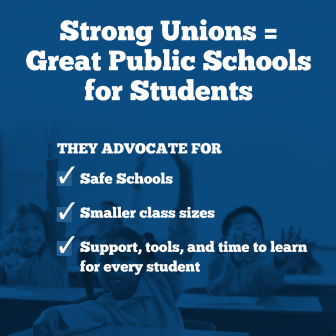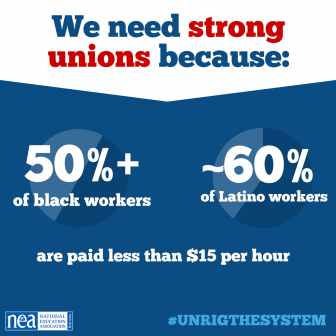U.S. Supreme Court’s Janus Ruling Deals Blow to Ohio’s Working Families
Wednesday, June 27, 2018, the U.S. Supreme Court issued a 5-4 decision overturning a 1977 ruling that public employee unions could, without violating First Amendment free speech rights, collect fair share or agency fees. The long-awaited decision is seen as a potential blow against collective bargaining.
The National Education Association (NEA), the nation’s largest union with more than 3 million members, filed an amicus brief in the case with the American Association of University Professors to expose the truly radical nature of the plaintiff’s arguments including unsupported and audacious legal claim that public-sector collective bargaining in itself is constitutionally suspect.
OEA is the state-level affiliate of NEA.
“As a 19-year classroom teacher, I know what my students need to succeed, and strong public employee unions give educators the collective voice to advocate for smaller class sizes, safer schools, and better learning conditions for their students,” said OEA President Becky Higgins. “Keeping our union strong is important in our advocacy for our students and for our fellow educators.”
At its core, Janus v. AFSCME (American Federation of State, County, and Municipal Employees) questioned whether non-union members – who share in the wages, benefits, and other protections negotiated by collectively bargained contract – may be required to pay a share of the cost of those negotiations.
The decision is a concerted attempt to weaken collective-bargaining rights by imposing right-to-work rules on public unions across the nation, including the Ohio Education Association’s more than 125,000 members.
It also contradicts the wishes of the American public. A recent Pew Research Center study finds that 55% of Americans have a favorable impression of unions and feel the large reduction in union representation has been mostly bad for working people in the U.S.
The ruling disregards jurisprudence and national precedent established by the Court’s 1977 decision in Abood v. Detroit Board of Education. The Court ruled in favor of a shared financial responsibility for a union’s collective-bargaining activity.
The ruling is also a sweeping repudiation of the will of Ohio voters. In 2011, Senate Bill 5 (SB5), which weakened collective-bargaining rights for public employees was repealed by nearly 62% of Ohio voters after a campaign by educators and other public employees against the measure.
“Many of our schools have faced serious funding cuts that are likely to grow even worse. We’ve seen it in the resources available to our students, and we have felt it in our paychecks,” said NEA President Lily Eskelsen García. “All over the country, they are cutting funding for arts and PE, up-to-date textbooks, and class sizes that allow for one-on-one instruction. A strong union and collective bargaining agreements are what help to ensure students receive the tools and resources they need to succeed in school and in life.”
Alex Price, an instrumental music teacher at Belmont High School and Wright Brothers Middle School in Dayton, adds, “Fine arts programs were being cut from my school and students were missing out on subjects like arts and music. My union negotiated with the district to bring back music so our students could have a well-rounded curriculum.
When some school principals tried to renege on the agreement, as a union, we stepped up. We came together through our union and spoke out for what our kids need. Strong unions build strong schools and strong communities. We need unions now more than ever.”
You Cannot Silence the Voice of Working People

Teaching children is pretty wonderful.
This has been my passion and in the 19 years that I taught, I learned from and have been inspired by my colleagues. I have also been moved by the actions of fellow union members who fought for better wages and safe working conditions.
The energy we are seeing with teachers standing up in the neighboring states of West Virginia and Kentucky and elsewhere as the #RedForEd movement spreads across the country is unparalleled in recent history. Public opinion is with us. A recent poll found that 62% of Americans believe the country is better off with stronger unions.
Yet, while this happening, amid the highest level of support for unions in 15 years, the US Supreme Court in a narrow 5-4, politically-motivated decision ruled that unions – specifically public employee unions — should be weaker. The Supreme Court ruled in the case of Janus v. AFSCME, Council 31 to further tilt the playing field in favor of the wealthy and corporate interests.
The court overturned 40 years of precedent in deciding that requiring so-called fair-share fees to be paid by people who choose not to join a public-sector union but who enjoy the benefits of union representation somehow violates the First Amendment of the Constitution. This doesn’t make sense, and it’s not right.
It also doesn’t make sense that so many people are finding it difficult to get by and provide for their families, no matter how hard they work. It doesn’t make sense that people are more productive than ever, but they’re working longer hours for less money and fewer benefits. And it doesn’t make sense that all this is going on while a handful of very wealthy people have seen their salaries and holdings skyrocket. It is shameful that the wealthy special interests behind the Janus case have succeeded in manipulating the highest court in the land to do their bidding.
"I believe deeply in the power of our collective voice to make sure that every teacher and student has the resources they need to be successful."

I believe deeply in the power of our collective voice to make sure that every teacher and student has the resources they need to be successful. When unions negotiate for working conditions in the classroom, they also negotiate for the conditions in which our children learn. When our unions advocate for us as educators, they also advocate for the students we serve.
Public service workers-teachers, social workers, firefighters, and nurses are more determined than ever to stick together in their unions. Unions remain the most effective vehicle for the power in numbers needed for working people to secure their rights and freedoms, and they provide a pathway to the middle class.
The truth is, when unions are strong, the entire community benefits. Unions use their collective voice to advocate for policies that help all working people — like increases to the minimum wage, affordable health care and great public schools.
Unions help close the pay gap for women and communities of color who have been systematically disadvantaged due to discrimination and prejudice.
African-American women in unions earn an average of $21.90 per hour, while non-union women earn $17.04. When Latinos are members of a union, their median weekly income increases by more than 38 percent.
The wealthy special interests that have benefited from an unfair, unbalanced playing field are now intent on tilting that playing field even more by attacking public-sector unions.
It’s driven by ideological extremists who oppose our basic right to organize. And it’s an attack on more than the men and women who are teachers and custodians and first responders; it’s an attack on anyone who wants to use their voice to fight for something better for their communities.
I have dedicated my life both to helping students and fighting for my community and I won’t back down.
My fellow educators and I are going to continue to speak out and I ask those who feel the same, please join us. Because no great social change — from ending slavery to securing the right to vote for every citizen, to winning the freedom to organize — has been achieved by standing alone.

Becky Higgins
President
Ohio Education Association
Categories
2018 Press ReleasesAbout Voices of Change
Education Support Professional
Higher Education Faculty
Higher Education Staff
Legislative Issues and Political Action
Local Leader
Member Stories
Membership
New Teacher
Non-educator
OEA Member
preK-12 Teacher
Retired Member
Student Member
What's New


